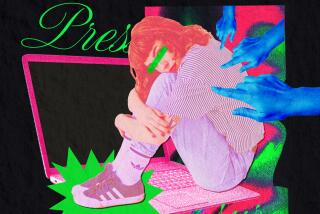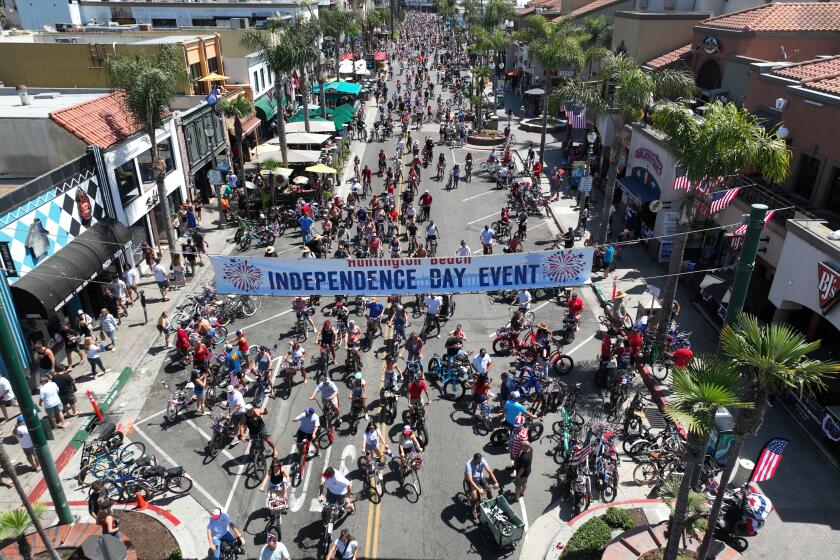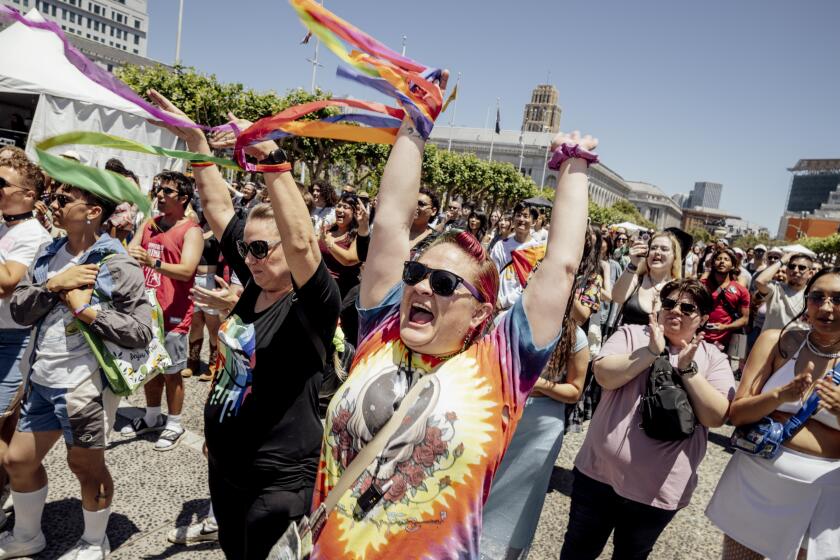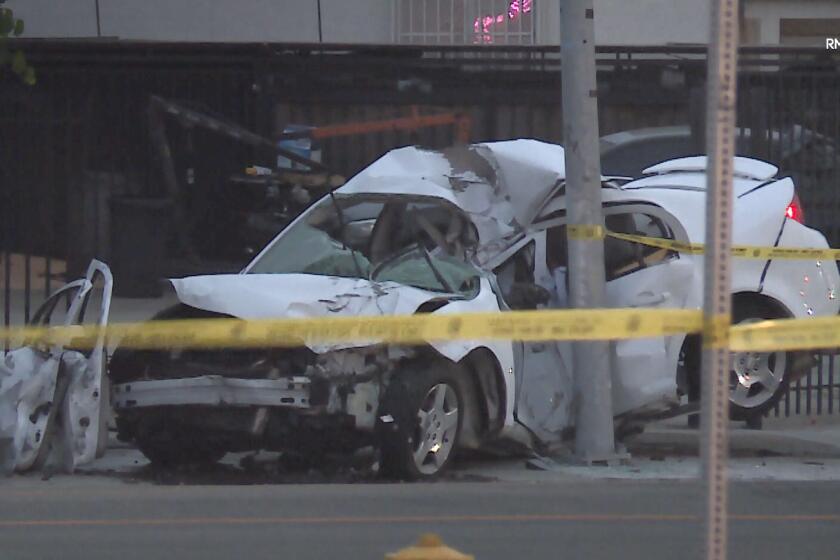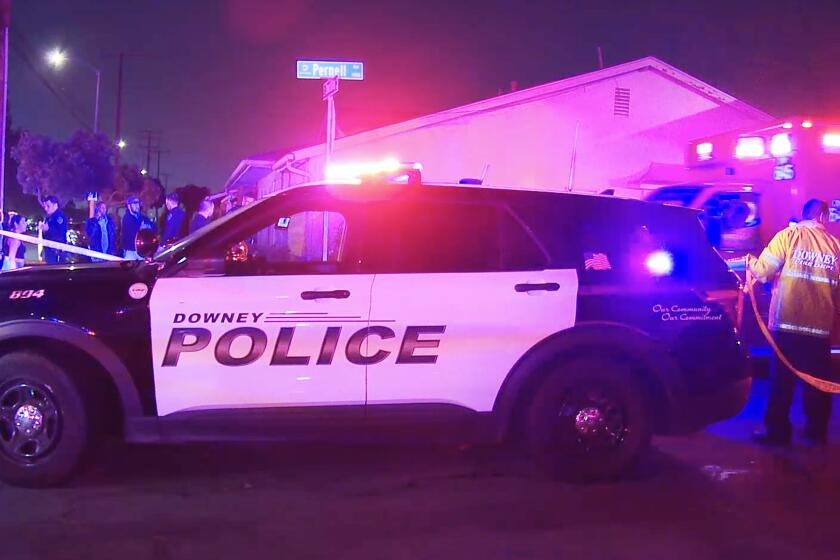Churches struggle to comfort Latinos feeling besieged in a Trump era marked by hate, fear
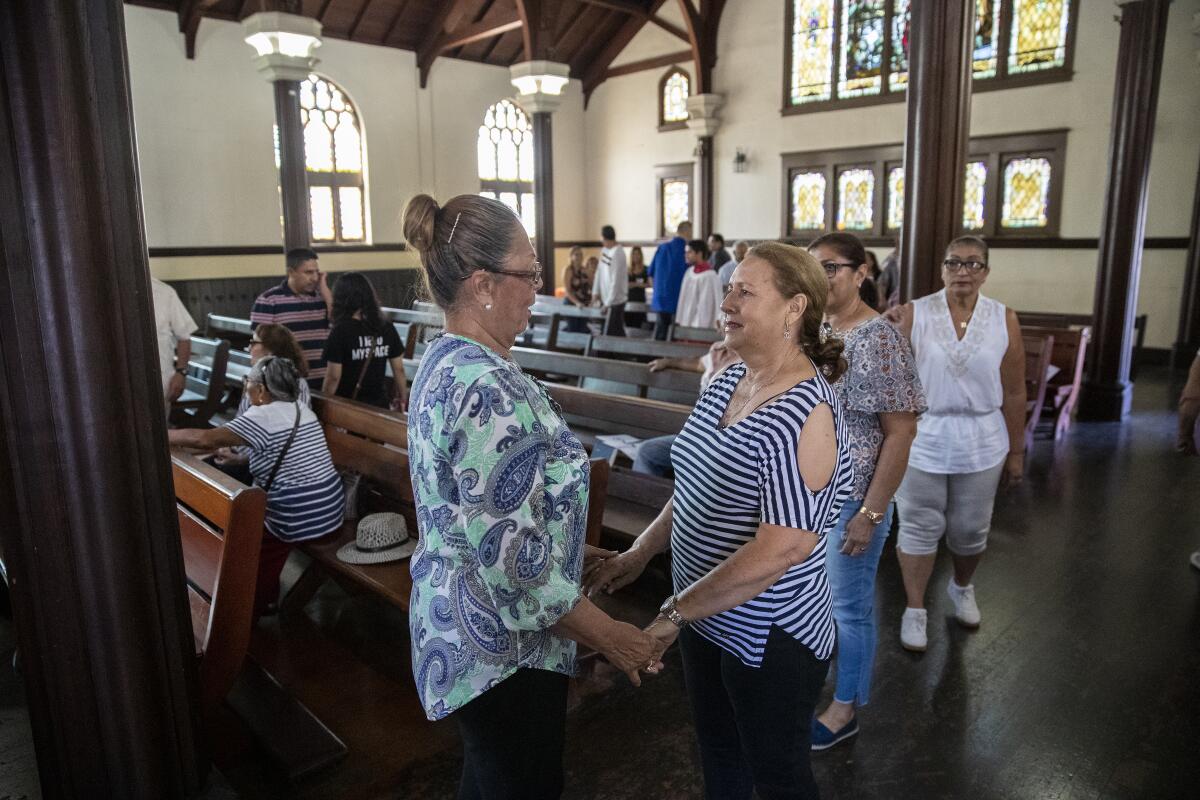
The service began with a moment of silence for the victims of mass shootings in El Paso; Dayton, Ohio; and Gilroy, Calif.
Parishioners bowed their heads and prayed.
“We invite the spirits of our brothers and sisters to be here today with us,” the Rev. Richard Estrada said in Spanish under the dark wooden ceiling of the Episcopal church in Los Angeles’ Lincoln Heights neighborhood.
Estrada’s sermon on Sunday at the Church of the Epiphany centered on embracing immigrants and dealing with fear. He spoke of the U.S. Immigration and Customs Enforcement raids in Missippipi and the shooting in El Paso that have instilled deep-seated anxiety in the Latino community. He urged parishioners to use vigilance and unity to overcome their apprehension.
“We have to create a loving community, sharing our cultures and our faith,” he said.
Many Latinos have turned to the church and clergy for support and advice on how to proceed at a time when their community is besieged by violence and racism.
Clergy members see their roles as faith leaders evermore intertwined with activism. Some say it is impossible to separate their faith from social justice issues. Many grapple with how to counsel parishioners about today’s troubling events.
On Sunday, some Latino parishioners said that they feel increasingly insecure and targeted in recent months and years.
“I’ve never felt so scared in my 42 years living in the United States as I have since Trump took office,” said Candy Canales, who is from Honduras.
Canales, 67, said that she has noticed clergy addressing current events more than ever before.
“We are praying that nothing happens to us,” she said as she stood in the back of the church after Estrada’s service.
Her friend, Laura Elena Mendoza, was deeply saddened by the threats and violence aimed at Latinos that she has seen in recent months, she said. But in these moments, she increasingly turns to her faith community.
“This is just going to make our faith grow stronger,” she said.
Estrada has been asking himself how he can support the Latino community that is hurting now, he said. In his sermon, he asked parishioners to have faith that change will come.
But in the meantime, he knows that clergy members have to take concrete steps toward making this happen. He offers dinners at his house on Wednesdays — clergy members have declared his church a sanctuary — and he will continue speaking out against a racist administration, he said.
“We are going to protect one another — that’s what we do.”
Guillermo Torres, project organizer for Clergy and Laity United for Economic Justice, an activist organization for interfaith members in the Los Angeles area, says he has seen more clergy approach the organization to ask how they can actively engage in supporting Latino and immigrant communities.
“The rhetoric from Washington is dehumanizing our communities,” he said. “We are being reached out to by many communities right now that had not been actively engaged before.”
Faith is a special way of dealing with atrocities such as the shooting in El Paso, said Melvin Valiente, the pastor at First Baptist Church of Maywood, because it provides hope that things can change for the better, that evil need not triumph. His parish pushes community members to speak out against injustice.
“We also tell them to raise their voices,” said Valiente, who says he has never lived through a moment of time with such overt racism and hate toward Latinos.
Valiente knows, however, that there are still many parishes where priests and pastors are hesitant to speak out too forcefully against attacks on Latinos, afraid to cross what they see as a line between politics and religion.
For churchgoer Cristina Tanta, this rings true. Every Sunday, she attends Mass at Our Lady Queen of Angels in downtown Los Angeles, also known as La Placita, a Catholic church long renowned among L.A. Latinos. On Sunday, she was sitting on a bench in the plaza adjacent to the church waiting for the 3 p.m. service. Around her, families bustled in and out of the church, waited in line for ice cream, and brought roses and daisies to lay in front of the altar of the Virgin Mary.
Tanta is a devout Catholic, but she said she wishes that the clergy would support the Latino community more in these difficult moments.
“The people who are passing through these difficult times are asking, where is God? We have to be prepared for a lot of pain and a lot of sadness,” she said. “The church doesn’t support us enough.”
But Miguel Angel Cortes, who is an associate pastor at Our Lady Queen of Angels, says he has been focusing on helping parishioners deal with concerns both in confession and in his homilies. Lately, common anxieties he hears from people include fears of leaving their house — and never coming back, being forever separated from their families, because of an ICE raid or a mass shooting.
He says that faith has the ability to allay such fears.
“Don’t be scared, I tell them, go out and fight for your dreams,” he said, pacing in his office next to Our Lady Queen of Angels. And he considers the possibilities of violence affecting him, too. “I sometimes think about what I would do if I were in church and there was a shooting.”
At the Church of the Epiphany, a history of community activism is evident. The Rev. Tom Carey describes the parish, which was founded in 1887, as a key organizing center during the Chicano movement of the 1960s and 1970s. Pictures and newspaper clippings about Chicano activism and past immigration enforcement actions line the basement church walls. “Wetback Roundup,” one headline reads; “Latinos for peace,” says a sign held up by activists in a photograph.
“The community wants to celebrate and lament together,” said Carey, adding that the church and faith provide a much-needed space for people to confront challenges together. “Faith comes in the ability to walk through our fear.”
But he says he has learned more from his parishioners that he can ever teach them.
“They don’t need me to tell them that, they’ve taught me that,” he said.
In Sunday’s service at the Church of the Epiphany, there was a small but devout audience of about 25 people. Parishioners hugged and shook hands when the moment came to offer each other a sign of peace.
Estrada spoke about choosing love over violence and guns and implored parishioners to find community solidarity through their faith. And he sent a clear message: “Let’s welcome the immigrants who come knocking on our door.”
More to Read
Start your day right
Sign up for Essential California for news, features and recommendations from the L.A. Times and beyond in your inbox six days a week.
You may occasionally receive promotional content from the Los Angeles Times.
